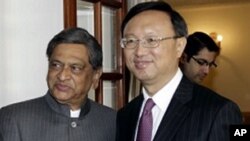India says its cooperation with China needs to be "deepened and broadened." With high-level talks taking place against the backdrop of a restive Tibet and decades-long disagreements between the emerging superpowers, New Delhi is offering assurances that its dialogue with Beijing is thorough.
Strategic partnership
Indian External Affairs Minister S.M. Krishna wrapped up talks with his visiting Chinese counterpart, Yang Jiechi, Thursday with a call to cultivate their strategic cooperative partnership.
"That strategic partnership needs to be strengthened, further broadened and that partnership needs to be more meaningful," he said.
China's envoy refrained from public comments after the talks, as is virtually always the case. However, Krishna said the discussions were thorough, and that no subject was spared.
"Every possible issue that is raised whenever China and India dialogue takes place were raised and we have understood each other's position," he added.
Krishna said Indian satellite data confirms that China does not appear to be engaging in any upstream diversion activities along a shared river that would endanger India's future water supply.
Opposing views
Concern about water resources is just one item on a list of new - and old - irritations between the two neighbors. India has countered China's position at the United Nations by supporting measures to condemn human rights abuses in Syria. And, for decades, it has hosted the Tibetan spiritual leader, the Dalai Lama, and an elected Tibetan administration Beijing describes as “separatists.” The issue has been especially sensitive in recent months, as protests and self-immolations increased in Chinese-controlled Tibet.
China has warned India to steer clear of fuel exploration deals with nations bordering the South China Sea, over which it claims maritime sovereignty. For decades, Beijing has also claimed an entire Indian state, Arunachal Pradesh, labeling it on maps as “southern Tibet.”
Police cleared away a small protest of Tibetan exiles from the China-India talks venue here in the Indian capital. Palden Sonam, local president of the activist Tibetan Youth Congress, complains Tibetan voices are ignored at such diplomatic gatherings.
"China does not have any legitimacy to decide its border relation with India," said Palden Sonam. "It's the border between Tibet and India and China has nothing to do with it."
China defeated India in a brief border war in 1962, but renewed armed conflict between the two is seen as highly unlikely. Bilateral trade is booming, with the two countries aiming at $100 billion in trade within three years.
Later this month, India is scheduled to host China in a summit of the so-called “BRICS” nations (short for Brazil, Russia, India, China, and South Africa). The nations will discuss their mutual concerns as some of the world's fastest emerging economies.




